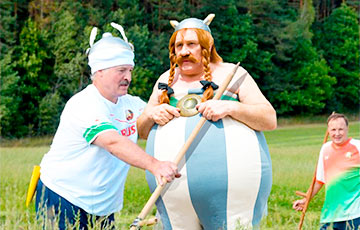Thing With Feathers
36- Aliaksandr Abukhovich, Belgazeta
- 4.09.2017, 8:10
- 67,162

The collapse of exports and GDP is inevitable without reforms.
The authorities are issuing calm statements again: the bottom of the crisis has been passed, our GDP is growing, the exports are increasing, the inflation is declining, the wages will be raised in the near future. A little patience, and everything will come right all by itself. Even reforms are not necessary.
In the meantime, there are staff cuts, a drop in real incomes of the population, an increase in the national debt, a curtailment of business, massive non-payments. External loans are the only material basis for the authorities’ reassuring statements. The loans, by the way, we will have to pay back. As well as the interest.
By the way, the Belarusian business, as well as the Russian one, tries not to take foreign currency loans at rates above 6%: expensive, will not be repaid. And our government, having the real sector’s profitability near 1% per annum in the best cases, got $ 1.4 billion at a rate of more than 7%. For what? God knows, such expensive resources cannot be directed to the economy, and it's too expensive to eat them away.
One thing is good – we’ll give them back in 10 years. Nobody is concerned that the state of the economy, which will be there in 10 years, is determined today. By investments, training of personnel, the formation of economic entities, which will have become operative by that time. And here, the investments are declining, and a disaster with the personnel training is coming up, and structural reforms are not even planned.
I have already written more than once that our statistics do not provide objective information about the state of affairs in the economy. Therefore, from my point of view, the growth or fall within 1-2% can be considered a statistical error, not affecting the conclusions about the state of the economy. But the fall in investment, their annual reduction do affect them crucially.
I have also written many times that the processes in the Belarusian and Russian manufacturing industries are developing in parallel and in a very similar way. That once again confirms: it is not a matter of the property, but of the economic policy. Therefore, the analysis conducted by Professor Khanin for Russia may be of interest for us.
Here are some excerpts.
"Over the past 25 years, half of the industrial infrastructure that the country inherited from the USSR has turned into junk, two thirds of fixed assets have reached a critical stage of wear and tear. In monetary terms, the economy has lost a material base worth 422 trillion rubles forever. This is much more than the losses in the Great Patriotic War. Then the reduction was 33.5%.
Russia's GDP did not grow by 13.4% from 1992 to 2015, as Rosstat assures, but decreased by 10.2%. The labor productivity for the same period fell by 30.1% instead of the official growth of 9.2%.
It’s been calculated that in the prices of 2015, 14.6 trillion rubles of investments will be required for the preservation of fixed assets and their growth of 3% per year. Plus 900 billion rubles – in working capital. It is necessary to invest 10.3 trillion rubles in the development of human capital – education, health care, scientific research. It will be 25.8 trillion rubles a year all together – a third of annual GDP."
Naturally, such expenses are too much even for rich Russia. Therefore, the stagnation will stay there for a long time, with unpleasant prospects for our exports.
The figures correspond with our calculations for Belarus. It turned out that for the same period, we lost 40-50% of fixed assets, $ 50-60 billion, irretrievably. Judging by Intehral, Haryzont, machine-tool construction, it is quite plausible, although the information for accurate calculations is classified.
And the fact that the Russians have converted part of the spent funds into assets abroad, and we have invested more in the social sphere, roads, agribusiness, etc., does not matter for the economy: this is the consumption withdrawn from the economy, which has been spent irrevocably. But the Russians compensate at least part of the eaten by the influx of the natural rent into the economy. They have quite modern enterprises. Few of them, but still there are some. We do not have even that.
Yes, our government could afford to be engaged in decorating, and to finance the social sphere which we did not earn, and even to get fancy. All that was done at the expense of the Soviet legacy and the growth of debts, which our grandchildren will have to repay. But every year, its opportunities decline.
Deepening of capital is still negative, export products' competitiveness is still falling, so the occasional market-determined growth in exports (when export prices rose by 20%) and growth in GDP by 0.9% can't be the evidence of the exit of our economy from the crisis. No matter how the officials and the government justified it.
Yes, the pricing environment is not favorable today. But there's an outstripping growth of prices for intermediate equipment already, Western and Chinese companies have already rushed into the Russian market, cutting our share on it. And if today we do not take measures that will lead to the development of new products, increasing the competitiveness of existing products, if we do not undertake structural reforms, tomorrow the collapse of both exports and GDP will inevitably happen. Of course, even then the authorities will find the guilty. But it will be much more complicated and expensive to fix everything.
Aliaksandr Abukhovich, Belgazeta









